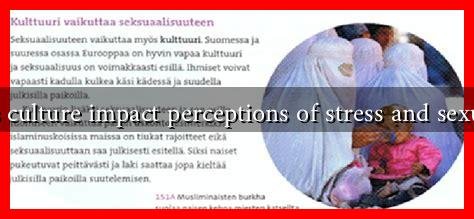-
Table of Contents
How Does Culture Impact Perceptions of Stress and Sexual Desire?
Culture plays a pivotal role in shaping our perceptions and experiences of various aspects of life, including stress and sexual desire. These two elements are deeply intertwined, influenced by societal norms, values, and beliefs. Understanding how culture impacts these perceptions can provide valuable insights into mental health, relationships, and overall well-being.
The Cultural Context of Stress
Stress is a universal experience, but its interpretation and management can vary significantly across cultures. Different societies have unique stressors and coping mechanisms, which can affect how individuals perceive and respond to stress.
- Individualism vs. Collectivism: In individualistic cultures, such as the United States, stress is often viewed as a personal challenge that one must overcome independently. Conversely, in collectivist cultures, like Japan, stress may be seen as a communal issue, where support from family and community plays a crucial role in coping.
- Workplace Expectations: In cultures with a strong work ethic, such as South Korea, long hours and high expectations can lead to chronic stress. In contrast, cultures that prioritize work-life balance, like those in Scandinavian countries, may experience lower stress levels.
- Stigma and Mental Health: In some cultures, discussing stress and mental health issues is stigmatized, leading individuals to internalize their struggles. For example, in many Middle Eastern cultures, mental health issues are often viewed as a sign of weakness, which can exacerbate stress.
Sexual Desire Through a Cultural Lens
Sexual desire is another area where cultural influences are profound. Different cultures have varying beliefs about sexuality, which can shape individual experiences and expressions of sexual desire.
- Norms and Taboos: In cultures with strict sexual norms, such as many conservative societies, sexual desire may be suppressed or viewed negatively. This can lead to feelings of guilt or shame, impacting overall sexual health.
- Gender Roles: Cultural expectations regarding gender can significantly influence sexual desire. In patriarchal societies, men may feel pressured to exhibit high sexual desire, while women may be expected to be more passive. This dynamic can create tension and misunderstandings in relationships.
- Sex Education: The level and type of sex education provided in different cultures can also affect perceptions of sexual desire. In cultures with comprehensive sex education, individuals may have a healthier understanding of their desires and boundaries compared to those in cultures with limited or no sex education.
Case Studies and Examples
Several studies illustrate the impact of culture on stress and sexual desire:
- A study published in the Journal of Cross-Cultural Psychology found that individuals from collectivist cultures reported higher levels of stress related to family obligations compared to those from individualistic cultures.
- Research conducted by the American Psychological Association revealed that cultural background significantly influences how people cope with stress, with collectivist cultures relying more on social support.
- A survey by the Guttmacher Institute highlighted that comprehensive sex education leads to healthier sexual attitudes and behaviors among young people, demonstrating the importance of cultural context in shaping sexual desire.
Conclusion
Culture profoundly impacts how individuals perceive and manage stress and sexual desire. By understanding these cultural influences, we can foster greater empathy and support for those navigating these complex experiences. Recognizing the role of cultural norms, values, and beliefs can lead to more effective coping strategies and healthier relationships. As we continue to explore the intersections of culture, stress, and sexuality, it becomes increasingly clear that a one-size-fits-all approach is inadequate. Tailoring support and education to fit cultural contexts is essential for promoting mental health and well-being.

